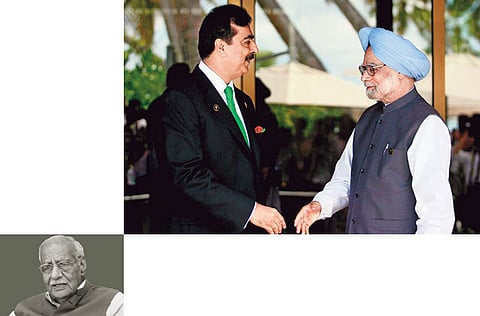Two prime ministers in trouble
Gilani faces contempt of court charge while Singh encounters moral responsibility in 2G scam case

Prime ministers of India and Pakistan have different stars to guide them. The Supreme Court of one country saves its prime minister while the that of the other asks his counterpart to appear before it for contempt. The cases have no similarity. Yet the message they convey is the same: the judiciary is independent and recognises no pulls from any quarters.
The lapse noted against Prime Minister Manmohan Singh is that his office (PMO) did not give sanction for 16 months to the prosecution of Telecommunications Minister A. Raja, who has been guilty of granting licences to mobile companies, (known as the 2G spectrum scandal) arbitrarily and illegally.
The Supreme Court exonerates Dr Manmohan Singh on the grounds that the nature of the PM's office is such that he cannot look into the details of every case. The PM's advisers were ‘duty bound to apprise him of the seriousness of the allegations' against the minister to enable the PM to take appropriate steps.
The court is justified in finding faults with PM's advisers and officers for having failed him. But it is difficult to believe that PMO did not inform Manmohan Singh about the sanction and that too when it had been pending for 16 months.
That the matter is an embarrassment for the prime minister goes without saying because his cabinet colleague was involved. Yet the explanation does not wash. True, Singh, heading a coalition government, had to be careful about the sensitivity of his ally, the Dravida Munnetra Kazhagam, which naturally backed A. Raja, its senior member. The public is not, however, concerned with the compulsions of alliance. It is a political matter which Congress President Sonia Gandhi has to sort out with the DMK chief M. Karunanidhi. It seems that the 16 DMK members in the Lok Sabha are so crucial to the government's tenure that it can go to any extent to placate them. Raja's case shows it.
The correspondence between Raja and the prime minister makes it clear that the PMO knew Raja was going about favouring certain parties, flouting all rules and norms. Still PMO did not do anything. Either it was instructed not to take any action or the office itself was mixed up.
My feeling is that PMO has grown so large that there is a confusion of authority and duplication of work. Former prime minister Jawaharlal Nehru had only one secretary, Tirlok Singh, who was also supervising the rehabilitation of refugees those days. When Lal Bahadur Shastri became the prime minister, he chose his secretary L.K.Jha who began spreading his wings, and began wielding authority. Still it was a small office. The real expansion was when Indira Gandhi assumed power. She turned it into a parallel government. She knew no bounds.
All ministries have one of their officers working in PMO. It became a mini-government. Manmohan Singh has kept the format in tact. The result can be seen from the fact that PMO has a finger in every pie, all departments of government.
Corruption
Still another blow to PMO, if not the prime minister, is the Supreme Court's cancellation of all the 122 licences which Raja had issued. The Court has directed them to be auctioned. The inquiry, as the Court has indicated, should be from the time when the BJP government was in power in 2001. I recall when I was the Rajya Sabha member. Pramod Mahajan was the Telecommunications minister. It was an open secret that his palm had to be greased before obtaining a licence. Even prime minister then, Atal Bihari Vajpayee was helpless in curbing him.
Again, it is the issue of cleanliness which is at the core of contempt notice by the Pakistan Supreme Court against Prime Minister Yousuf Raza Gilani. He was directed to write to the Swiss government to reopen the cases of graft against President Asif Zardari. That General Pervez Musharraf had closed the cases against him and his wife the late Benazir Bhutto through National Reconciliation Ordinance (NRO) is a fact. Yet the Court in its wisdom has reopened the cases of corruption.
In a way, both the prime ministers in India and Pakistan face a moral issue. Gilani can be hauled up for contempt and lose his office. Manmohan Singh can own the moral responsibility for PMO's lapses and offer to quit. This is normal in democracy. However, the matter will be decided by the elected representatives of parliament in India. Pakistan has the trappings of democracy, the elected national assembly, but the real power lies with the army.
However, Pakistan has come to have a third chamber, the Supreme Court. That it is being backed by the army is a coincidence. It is the army which has pushed the case of Gilani who had displeased it with the ‘memogate', the Zardari government asking America to intervene because of the threat of army coup. The commission which the Supreme Court has appointed is not to the liking of Zardari and Gilani. But they can do little because the commission has been appointed by the Supreme Court.
Kuldip Nayar is a former Indian High Commissioner to the United Kingdom and a former Rajya Sabha member.


